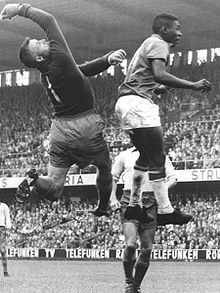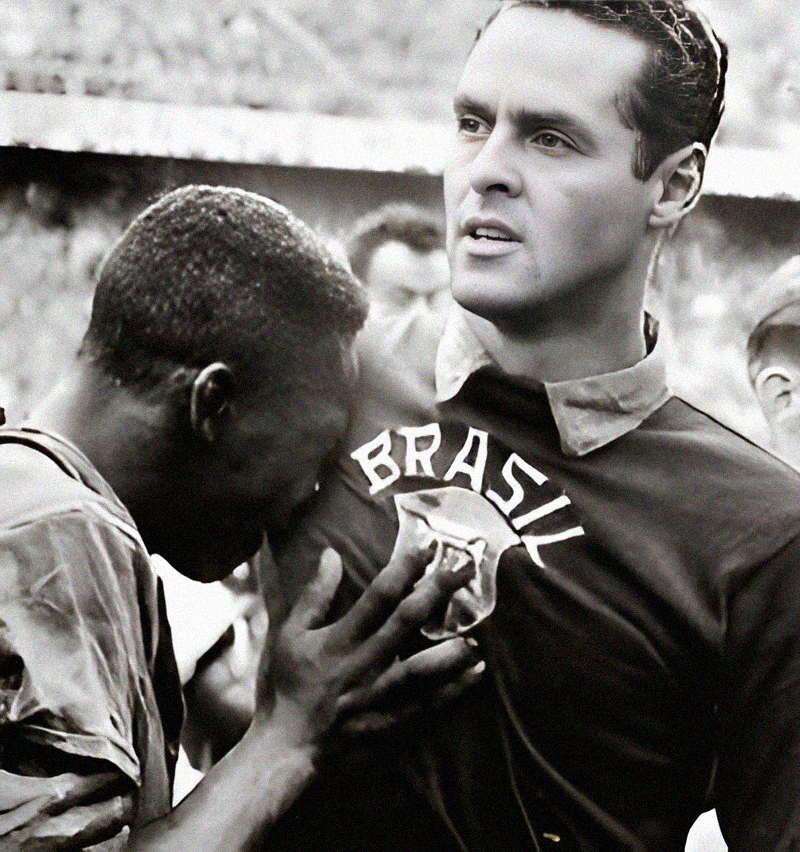Pelé's first international match was a 2–1 defeat against Argentina on 7 July 1957. In that match, he scored his first goal for Brazil aged 16 years and 9 months to become the youngest player to score in International football.
1958 World Cup
His first match in the World Cup was against the USSR in the first round of the 1958 FIFA World Cup, on the third game of the Cup, alongside Garrincha, Zito and Vavá. He was the youngest player of that tournament, and at the time the youngest ever to play in the World Cup. He scored his first World Cup goal against Wales in quarterfinals, the only goal of the match, to help Brazil advance to semifinals, while becoming the youngest ever World Cup goalscorer at 17 years and 239 days. Against France in the semifinal, Brazil was leading 2–1 at halftime, and then Pelé scored a hat-trick, becoming the youngest in World Cup history to do so.On 19 June 1958 Pelé became the youngest player to play in a World Cup final match at 17 years and 249 days. He scored two goals in the final as Brazil beat Sweden 5–2. His first goal, a lob over a defender followed by a precise volley shot, was selected as one of the best goals in the history of the World Cup. When the match ended, he passed out on the field, and had to be attended by the medical staff. He then recovered, and was visibly compelled by the victory; in tears as he was being congratulated by his teammates. He finished the tournament with six goals in four matches played, tied for second place, behind record-breaker Just Fontaine.
It was in the 1958 World Cup that Pelé began using a number 10 t-shirt that immortalized him. Recently it is known that the event was the result of disorganization: the leaders didn't send the shirt numbers of players and it was up to FIFA to choose the number 10 shirt to Pele, who was a substitute on the occasion. The press of the time cataloged Pelé as the greatest revelation of the 1958 Cup.
1962 World Cup

Pelé fighting for a ball against the Swedish goalkeeper Kalle Svensson during the 1958 World Cup final.
1966 World Cup
The 1966 World Cup was marked, among other things, for the brutal fouling on Pelé, by the Bulgarian and Portuguese defenders. Brazil was eliminated in the first round, playing only three matches. Pelé scored the first goal from a free kick against Bulgaria, but due to his injury, a result of persistent fouling by the Bulgarians, he was left out for the second game against Hungary. Brazil lost that game and Pelé, although still recovering, was brought back for the last crucial match against Portugal. In that game João Morais brutally fouled Pelé, but was allowed to stay on field by referee George McCabe. Pelé had to stay in the field limping for the rest of the game, since substitutes were not allowed at that time. After this game he vowed he would not play again in the World Cup, a decision he would later change.1970 World Cup
Pelé was called to the national team in early 1969, he refused at first, but then accepted and played in six World Cup qualifying matches, scoring six goals. The 1970 World Cup in Mexico was to be Pelé's last. Brazil's squad for the tournament featured major changes in relation to the 1966 squad. Players like Garrincha, Nilton Santos, Valdir Pereira, Djalma Santos, and Gilmar had already retired, but the team, with Pelé, Rivelino, Jairzinho, Gérson, Carlos Alberto Torres, Tostão, and Clodoaldo, is widely considered as one of the greatest ever football teams.In the first match, against Czechoslovakia, Pelé gave Brazil a 2–1 lead, by controlling Gerson's long pass with his chest and then scoring. In this match Pelé audaciously attempted to lob goalkeeper Ivo Viktor from the half-way line, only narrowly missing the Czechoslovak goal. Brazil went on to win the match, 4–1. In the first half of the match against England, he nearly scored with a header that was spectacularly saved by Gordon Banks. In the second half, he assisted Jairzinho for the only goal of the match. Against Romania, he opened the score on a direct free kick goal, a strong strike with the outside of his right foot. Later on in the match he scored again to take the score to 3–1. Brazil won by a final score of 3–2. In the quarterfinals against Peru, Brazil won 4–2, with Pelé assisting Tostão on for Brazil's third goal. In the semi-finals, Brazil faced Uruguay for the first time since the 1950 World Cup final round match. Jairzinho put Brazil ahead 2–1, and Pelé assisted Rivelino for the 3–1. During that match, Pelé made one of his most famous plays. Tostão gave Pelé a through ball, and Uruguay's goalkeeper Ladislao Mazurkiewicz took notice of it. The keeper ran off of his line to get the ball before Pelé, but Pelé got there first, and without touching the ball, he caused it to go past the keeper, to the latter's left, while Pelé went right. Pelé went around the goalkeeper and took a shot while turning towards the goal, but he turned in excess as he shot, and the ball drifted just wide of the far post.
Brazil played Italy in the final, with Pelé scoring the opener, with a header over Italian defender Tarcisio Burgnich. He then made assists on Jairzinho's and Carlos Alberto's goals, the latter one coming after an impressive collective play. Brazil won the match 4–1, keeping the Jules Rimet Trophy indefinitely. Burgnich, who marked Pelé during the match, was quoted saying "I told myself before the game, he's made of skin and bones just like everyone else — but I was wrong".
Pelé's last international match was on 18 July 1971 against Yugoslavia in Rio de Janeiro. With Pelé on the field, the Brazilian team's record was 67 wins, 14 draws, and 11 losses, and they won three World Cups. Brazil never lost a match while fielding both Pelé and Garrincha. The only international match Garrincha lost was against Hungary in 1966, 1–3, which Pelé did not play in because of injury.


0 comments:
Post a Comment